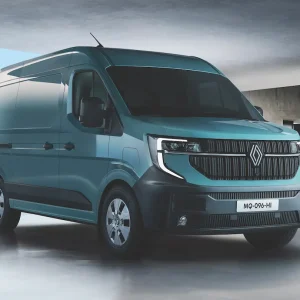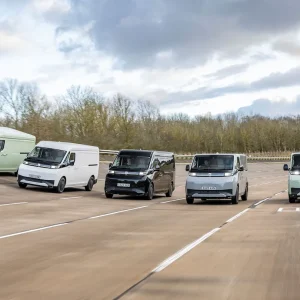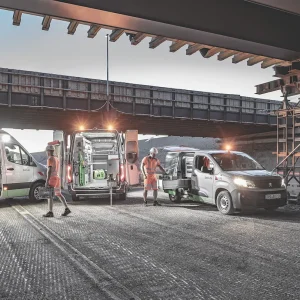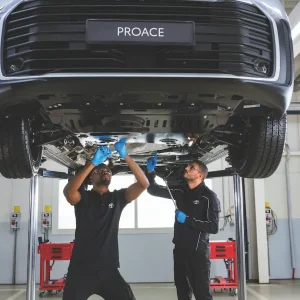While a tracking system should help you get your van back eventually if it's stolen, it's likely to be returned to you minus the cargo. Odds are that the thieves will have damaged your pride and joy while breaking in and they may, of course, decide to torch it once they have no further need for it. And what use is a burnt-out hulk?
The best thing to do is make your vehicle far more difficult to steal to begin with and one of the most important steps you can take is to fit better quality door locks.
Lock Tight
 There's no denying that the locks fitted to vans on the production line have improved considerably over the past few years. There is no reason, however, why they shouldn't be beefed up even further or why supplementary locks shouldn't be fitted to make the lives of thieves even more difficult.
There's no denying that the locks fitted to vans on the production line have improved considerably over the past few years. There is no reason, however, why they shouldn't be beefed up even further or why supplementary locks shouldn't be fitted to make the lives of thieves even more difficult.
So far as vans on multi-drop delivery work are concerned one of the best steps that can be taken is to fit slamlocks. As their name suggests, they lock automatically as soon as the door is slammed and can only be opened again using a key.
They can either be deployed as a substitute for the vehicle manufacturer's lock barrel or fitted alongside it with the cam linked to the door securing mechanism.
Using a different approach to slamlocking to achieve the same end, Activelock OE from Maple Fleet Services interfaces with the vehicle's existing central locking system. The result is that whenever a door is closed, it automatically locks.
Shielded
Slamlocks are designed to resist being picked or drilled and are typically protected from interference by shielding. Expresslock's Tough Lock, for instance, is surrounded by three steel shields each 2mm thick.
“When it comes to light commercial theft smashing windows makes a lot of noise, so thieves prefer to attack other parts of the vehicle which are known to be vulnerable,” says a spokesman for Armaplate. “The most common of these by far are the areas around the door locks, so you should make every effort to provide them with protection.”
Armaplate offers a protection system that completely encases them. A stainless steel plate defends the outside of the door — visual deterrents can prompt thieves to try their luck elsewhere — reinforced by another steel plate on the inside. The exterior plate has threaded studs on the reverse side that go through the door skin and through the steel backing plate, and the three layers are bonded together with 10mm locking nuts.
“The barrier that is created has an ultra-slim profile that prevents it from being gripped and torn through the weak door skin,” says the spokesman.
That's the drawback of fitting hasps and staples, he points out. While they look impressive, they're often easy to tear off because their bulk means that the thief has something that can be gripped with a tool.
Armaplate can also supply a slamlock under the ArmaLock banner.
Deadlocks
 Some operators favour deadlocks. Designed to resist attack, often fitted as supplementary protection and working independently of the vehicle's factory-fitted locking system, they have to be physically locked and unlocked using a key. Locks 4 Vans markets a package under the Euroslam banner that includes both slamlocks and deadlocks, while Maple offers them under the Vanguard brand.
Some operators favour deadlocks. Designed to resist attack, often fitted as supplementary protection and working independently of the vehicle's factory-fitted locking system, they have to be physically locked and unlocked using a key. Locks 4 Vans markets a package under the Euroslam banner that includes both slamlocks and deadlocks, while Maple offers them under the Vanguard brand.
Electronic
Electronically controlled locks can be installed too. Locks 4 Vans offers Diablock, a system that uses 28mm electro-magnetic bolts to secure the rear and side load area doors. They can be controlled using an on-off switch in the cab, by the vehicle's central locking system, or locked or unlocked whenever the van's alarm is armed or disarmed.
Expresslock provides an electronic locking package controlled by a fob/zapper, a credit card sized transponder, or by a RFID (Radio Frequency IDentification) tag.
Money Talks
Buy a single Tough Lock from Expresslock, for instance, and it will set you back £61, rising to £307 for five. To that you need to add the cost of having your new locks installed.
Bespoke
“No matter what type of lock kit you fit, it should be specific to the door of the vehicle concerned rather than a generic package,” contends Locks 4 Vans managing director, Christopher Batterbee.
The fit of a generic kit may not be exact enough, he argues; and that little bit of vulnerability could give the thief the opportunity he needs.
Locks need to be capable of standing up to dirty and dusty working conditions, and bad weather as well as to thieves, Batterbee points out. “Our lock cylinders have been subjected to 500 hours of salt mist spray testing,” he says.
About to move into new premises, and with lock defender security plates forming part of its product portfolio, Locks 4 Vans has recently acquired the locks division of Scorpion Automotive.
“Demand for extra locks for vans is strong and probably growing,” he says. “This suggests that people are realising that vehicle manufacturers are not supplying the level of protection that they should.”
“Business is buoyant, no question about it,” says Expresslock managing director, Tony Withey.
Express Logistics
Such is the stress that Express Logistics places on security that it has had one of the most sophisticated security systems available installed in two of its Mercedes-Benz Sprinter 315CDI vans. It was developed by Maple Fleet Services.
As well as deadlocks, a panic button and satellite tracking, each vehicle features a camera system using 3G mobile phone technology that allows the company to receive live pictures from the vehicles via the internet while they're out on the road. Such a high level of security is proving to be a valuable marketing tool for Express, which is based near Heathrow Airport.
The cameras record what is happening during deliveries. The load area locks are RFID controlled and access can be restricted solely to authorised personnel.
If needs be the van's cargo box can be sealed secure at the point of dispatch with only the end customer and the customs authorities given the means to access it.
“I think we've got the most secure vehicle of its type to date,” says Express Logistics managing director, Mark Priestley.
“It allows my company to offer a level of security that is normally associated with the operators of armoured cash-in-transit vans, but at a fraction of the cost,” he continues. “I can pass this on to my customers while significantly raising the standard of goods-in-transit security they are being offered.”
Tool Theft
 It's not just cargo that needs defending, Batterbee points out. The tools used by plumbers, electricians, carpenters and other trades people are vulnerable to theft too.
It's not just cargo that needs defending, Batterbee points out. The tools used by plumbers, electricians, carpenters and other trades people are vulnerable to theft too.
“If you're a tradesman, then your tools are part of you,” he says. “You may have made some of them yourself, or modified them to suit your particular way of working.
“You may, for example, have a chisel that you've ground down over the years and that's just the right length and weight for your purposes.” Its loss will be devastating.
The prospect of replacing what is in many respects irreplaceable can prompt some trades people to leave their trade altogether, abandoning skills built up over many years. That's a sad end to a career, as well as a loss to the community; and it shouldn't be necessary.
Thatcham
If you want to check just how secure your van really is, then visit the Motor Insurance Repair Research Centre's web site and discover the, sometimes worrying, truth. Set up by the insurance industry, and usually known simply as Thatcham because it happens to be based in Thatcham in Berkshire, the centre gives vehicles a star rating based on how capable they are of resisting the attentions of thieves.
VERDICT
Theft of and from light commercials remains a big problem in the UK and operators need to be pro-active when it comes to vehicle security. Factory-fitted locks and alarms may not be sufficient protection, especially if high-value items are carried frequently.






